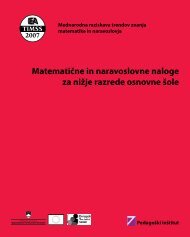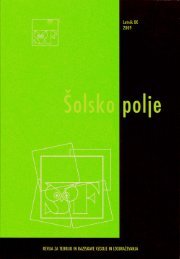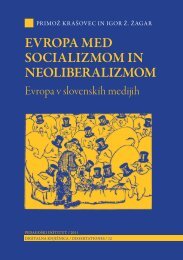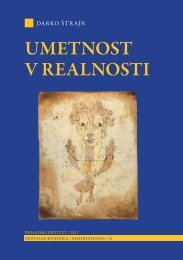88 ŠOLSKO POLJE LETNIK <strong>XX</strong> ŠTEVILKA 5/6Karadžić has been (only) the president of Republic Srpska (and not a warcriminal), and now they have arrested him. While employing this particularprinciple, TS contributes to the masking of the responsibility of the Serbs forthe crimes committed in BH. It continues to cultivate the myth of an innocentSerbia, propagating the thesis that Serbs have always been victims of someexternal enemy, conspiring to annihilate them. In that way, Karadžić is positionedas someone who acted strongly to revenge past wrongs. TS attempts toerase the Serbian crimes in BH that were committed in the name of GreaterSerbia, with the political, military, economic support of the majority of theSerbs (Čolović, 2002; MacDonald, 2002; Popov, 2000; Repe, 2008).(C) Abstraction/PersonalizationWhat types of abstraction and generalization dominated the analyzed TSnews programs? The arrest of Karadžić was generalized in two ways. First,the already limited coverage of Karadžić’s war crimes was portrayed in »arelative way«, framed in terms of moral equivalence (see example 3) anddescribed not as intentional acts but as »accidents.«3. A journalist: What war crimes did Radovan Karadžić commit? What ishe responsible for?Vladislav Jovanović: We have to know that it wasn’t only Karadžićwho’s been involved. Other presidents were participating, too, butthey were not sent to The Hague. /.../ Accidents happened on all sides…and these have much deeper causes. (July 23 2008, »RadovanKaradžić – Myth and Reality«)In the above response, the source implicitly acknowledged that Karadžićis guilty of crimes, but he has generalized them (»others were involved«)and relativized them (»in a war, this kind of thing happens – everyonewas doing it«). This practice remains a crucial strategy for representingwar crimes (for more, see Wodak, 2006). Moreover, the source used theterm »accident«, which is a typical euphemism in Serbian nationalistic discourse(Luković, 2002): it transposes criminal acts into the unintentionalrealm of chance, thereby refusing to acknowledge that war crimes werealso committed by Serbs. The use of the notion »an accident« is illustrative– since an accident can happen without an intentional cause by someexternal »objective« force. Because the journalist did not challenge the re-
JOURNALISTIC (RE)PRODUCTION OF HISTORY: TELEVIZED COVERAGE OF RADOVAN ...89lativization of crimes or at least, demand an additional explanation, animplicit agreement with the source of information was established.TS claimed that Karadžić’s arrest means a shift towards the EU pathfor Serbia – it attempted to frame the significance of Karadžić arrest as fulfillingthe EU’s requirements and thereby rendering Serbia deserving ofbeing rewarded by the EU (see example 4).4. Goran Svilanović, former Yugoslav minister of foreign affairs claimedthat we the Serbs have now proven to the world that we are finally onthe path towards entry into the European Union. He added that Serbiahas to be rewarded by the EU. The EU has to cease its attempts atblackmail. (July 23 2008,«Radovan Karadžić – Myth and Reality«)TS has used the »reverse« principle here. Personalization can be definedas a preference for or focus upon the individual actor(s) and human interestangles in events, while downplaying institutional and political considerationsthat establish their social context. Many authors claim thatincreased media personalization results from the values embedded in television(e.g. Blumler and Kavanagh, 1999; Swanson and Mancini, 1996).In this regard, the commercial and political values of entertainment takeprecedence over the public service ideals of journalism. Especially becauseof its visual nature, television tends to focus on personalities rather thanon abstract entities such as parties and groups (Peri, 2004). Furthermore,the effect of personalized news is to decontextualize news events andespecially to overlook structural power relations (Johnson-Cartee, 2005).The consequence is also to naturalize war, through the breakdown of warinto episodes, or series of events, each reported and described largely inisolation. This logic serves to conceptualise war as disconnected »events«rather than as an ongoing political and military process. The »human story«becomes separated from the military-political policy of war, and thepast. In a sense, restorative nostalgia is implicitly used here as »truth andtradition« – TS restores its vision of the golden past as a stable construct.In the analyzed news stories, the focus on drama, visual spectacle,human-interest stories and personalization means a focus on one persononly – that is, a heavy emphasis on Karadžić to the exclusion of other socialactors and the social context that helped to frame Karadžić’s life. All ofthis results in the construction of a narrative suggesting that Karadžić workedindependently, without official Serbian state support. This meaninggets reinforced by the use of the word »only« (see example 5).
- Page 3:
VSEBINA LETNIK XX ŠTEVILKA 5/6 Z
- Page 7 and 8:
UVODNA NOTICAIgor Ž. ŽagarTole pi
- Page 9 and 10:
ZA KAJ GRE V KAD - PREGLEDZGODOVINE
- Page 11 and 12:
ZA KAJ GRE V KAD - PREGLED ZGODOVIN
- Page 13:
ZA KAJ GRE V KAD - PREGLED ZGODOVIN
- Page 17 and 18:
ZA KAJ GRE V KAD - PREGLED ZGODOVIN
- Page 19 and 20:
ZA KAJ GRE V KAD - PREGLED ZGODOVIN
- Page 21 and 22:
ZA KAJ GRE V KAD - PREGLED ZGODOVIN
- Page 23 and 24:
ZA KAJ GRE V KAD - PREGLED ZGODOVIN
- Page 25 and 26:
ZA KAJ GRE V KAD - PREGLED ZGODOVIN
- Page 27 and 28:
DISKURZ: FOUCAULT, LACLAU TERZAPOPA
- Page 29 and 30:
DISKURZ: FOUCAULT, LACLAU TER ZAPOP
- Page 31 and 32:
DISKURZ: FOUCAULT, LACLAU TER ZAPOP
- Page 33 and 34:
DISKURZ: FOUCAULT, LACLAU TER ZAPOP
- Page 35 and 36:
DISKURZ: FOUCAULT, LACLAU TER ZAPOP
- Page 37 and 38:
DISKURZ: FOUCAULT, LACLAU TER ZAPOP
- Page 39 and 40: DISKURZ: FOUCAULT, LACLAU TER ZAPOP
- Page 41 and 42: DISKURZ: FOUCAULT, LACLAU TER ZAPOP
- Page 43 and 44: DISKURZ: FOUCAULT, LACLAU TER ZAPOP
- Page 45 and 46: DISKURZ: FOUCAULT, LACLAU TER ZAPOP
- Page 47 and 48: DISKURZ: FOUCAULT, LACLAU TER ZAPOP
- Page 49 and 50: TOPOI IN CRITICAL DISCOURSE ANALYSI
- Page 51 and 52: TOPOI IN CRITICAL DISCOURSE ANALYSI
- Page 53 and 54: TOPOI IN CRITICAL DISCOURSE ANALYSI
- Page 55 and 56: TOPOI IN CRITICAL DISCOURSE ANALYSI
- Page 57 and 58: TOPOI IN CRITICAL DISCOURSE ANALYSI
- Page 59 and 60: TOPOI IN CRITICAL DISCOURSE ANALYSI
- Page 61 and 62: TOPOI IN CRITICAL DISCOURSE ANALYSI
- Page 63 and 64: TOPOI IN CRITICAL DISCOURSE ANALYSI
- Page 65 and 66: TOPOI IN CRITICAL DISCOURSE ANALYSI
- Page 67 and 68: TOPOI IN CRITICAL DISCOURSE ANALYSI
- Page 69 and 70: TOPOI IN CRITICAL DISCOURSE ANALYSI
- Page 71 and 72: TOPOI IN CRITICAL DISCOURSE ANALYSI
- Page 73 and 74: TOPOI IN CRITICAL DISCOURSE ANALYSI
- Page 75 and 76: TOPOI IN CRITICAL DISCOURSE ANALYSI
- Page 77 and 78: University of Queensland, Centre fo
- Page 79 and 80: JOURNALISTIC (RE)PRODUCTION OF HIST
- Page 81 and 82: JOURNALISTIC (RE)PRODUCTION OF HIST
- Page 83 and 84: JOURNALISTIC (RE)PRODUCTION OF HIST
- Page 85 and 86: JOURNALISTIC (RE)PRODUCTION OF HIST
- Page 87 and 88: JOURNALISTIC (RE)PRODUCTION OF HIST
- Page 89: JOURNALISTIC (RE)PRODUCTION OF HIST
- Page 93 and 94: JOURNALISTIC (RE)PRODUCTION OF HIST
- Page 95 and 96: JOURNALISTIC (RE)PRODUCTION OF HIST
- Page 97 and 98: JOURNALISTIC (RE)PRODUCTION OF HIST
- Page 99 and 100: JOURNALISTIC (RE)PRODUCTION OF HIST
- Page 101 and 102: JOURNALISTIC (RE)PRODUCTION OF HIST
- Page 103 and 104: THE VOICE OF AN AGENDA-SETTINGAUTHO
- Page 105 and 106: THE VOICE OF AN AGENDA-SETTING AUTH
- Page 107 and 108: THE VOICE OF AN AGENDA-SETTING AUTH
- Page 109 and 110: THE VOICE OF AN AGENDA-SETTING AUTH
- Page 111 and 112: THE VOICE OF AN AGENDA-SETTING AUTH
- Page 113 and 114: THE VOICE OF AN AGENDA-SETTING AUTH
- Page 115 and 116: THE VOICE OF AN AGENDA-SETTING AUTH
- Page 117 and 118: THE VOICE OF AN AGENDA-SETTING AUTH
- Page 119 and 120: THE VOICE OF AN AGENDA-SETTING AUTH
- Page 121 and 122: THE VOICE OF AN AGENDA-SETTING AUTH
- Page 123 and 124: THE VOICE OF AN AGENDA-SETTING AUTH
- Page 125 and 126: THE VOICE OF AN AGENDA-SETTING AUTH
- Page 127 and 128: THE VOICE OF AN AGENDA-SETTING AUTH
- Page 129 and 130: THE VOICE OF AN AGENDA-SETTING AUTH
- Page 131 and 132: THE VOICE OF AN AGENDA-SETTING AUTH
- Page 133 and 134: THE VOICE OF AN AGENDA-SETTING AUTH
- Page 135 and 136: ‘68 KOT HKRATNA KRIZA EVROPSKEGAZ
- Page 137 and 138: ‘68 KOT HKRATNA KRIZA EVROPSKEGA
- Page 139 and 140: ‘68 KOT HKRATNA KRIZA EVROPSKEGA
- Page 141 and 142:
‘68 KOT HKRATNA KRIZA EVROPSKEGA
- Page 143 and 144:
‘68 KOT HKRATNA KRIZA EVROPSKEGA
- Page 145 and 146:
‘68 KOT HKRATNA KRIZA EVROPSKEGA
- Page 147 and 148:
‘68 KOT HKRATNA KRIZA EVROPSKEGA
- Page 149 and 150:
‘68 KOT HKRATNA KRIZA EVROPSKEGA
- Page 151 and 152:
‘68 KOT HKRATNA KRIZA EVROPSKEGA
- Page 153 and 154:
‘68 KOT HKRATNA KRIZA EVROPSKEGA
- Page 155 and 156:
‘68 KOT HKRATNA KRIZA EVROPSKEGA
- Page 157 and 158:
‘68 KOT HKRATNA KRIZA EVROPSKEGA
- Page 159 and 160:
POVZETKI/ABSTRACTSZA KAJ GRE V KAD
- Page 161 and 162:
POVZETKI / ABSTRACTS159NOVINARSKA (
- Page 163 and 164:
POVZETKI / ABSTRACTS161‘68 AS PAR
- Page 165 and 166:
AVTORJI/AUTHORSRuth WodakRuth Wodak
- Page 168 and 169:
166 ŠOLSKO POLJE LETNIK XX ŠTEV
- Page 170 and 171:
168 ŠOLSKO POLJE LETNIK XX ŠTEV
- Page 172:
ZAHVALARevija Šolsko polje izhaja
















